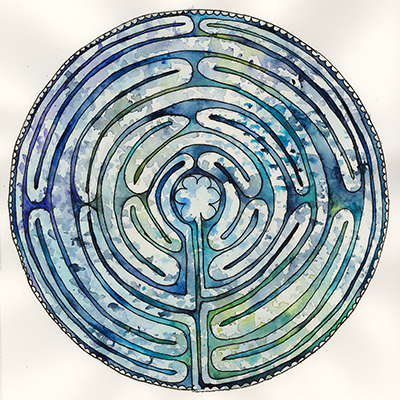by Arthur Paul Patterson
MY SON IS grown now, but back when he was around 7, Sean came home with an award. It was a Nifty Neat Work Award. I was proud, but my parental pride was interrupted by the realization that I wanted to place my son above the other kids. I hoped I'd never do that, but I did. Later, Sean informed me that most of the kids got awards. I wasn't quite as excited once I understood this! As it says in Genesis, my countenance fell.
The Comparison Game
Like me with my young son, we are inclined to put our passions into seeing where we stand in relationship with one another. It's about comparison. We look at each other, not so much to honestly evaluate one another but to discern what degree of giftedness our brother or sister has in relation to ourselves. We look over our shoulders to see how someone else does. When we live comparatively like that, the sole purpose of life is to gauge our significance. We all have doubts about ourselves and our worth. It's natural. But the more doubt we have about ourselves, and the more we compare with others, the more embarrassing a predicament we have.
If you have any doubts about that, allow someone whom you consider either your peer or your better to watch you in action in any area you feel skilled in. It's okay when you're giving a talk with people who know nothing about your subject. You look good! But when you're with people who are knowledgable, you get insecure. Trades people who watch other trades people are always comparing and become "Holmes on Holmes". The same thing happens in other areas.
Years ago, I was with a group who teach and interpret MBTI (Myers-Briggs Type Indicator), a psychological tool for understanding and appreciating differences in people. I was on the board, and we met to discuss the ways in which we conduct workshops. We listened very intently to one another, and my hunch was that the intensity of that listening had something to do with gauging where we stood in relation to one another.
Speaking for myself, I was particularly interested in figuring out if I communicated the test very objectively and precisely. Some of you know that detailed precision is not my strength and I value creativity as much as objectivity. In other words, I am a bit intimidated by precision. The person presenting their approach to teaching was high on statistical proof, and I was high on insecurity! Had he been presenting, I am sure he would have wondered about his ability to inspire people and apply the test in a creative manner. Most of us have been in this situation. We are all situated on this boundary between insecurity and genuine interest when receiving feedback. We are in a very uncomfortable place, and it can lead to comparing ourselves with others. Comparison usually results in personal shame or criticism of the other person. We either feel really dumb or like we need to criticize and tear down the other person. Rather than build up and enhance the presentation, we look for flaws.
According to Philippians, both attitudes are sub-Christian. Today's text situates us on this boundary and provides a third way to understand ourselves in relation to other people. This revised self-understanding is not an altogether unimportant concept for all of us here at Watershed.

6 Though he was in the form of God,
he did not consider being equal with God something to exploit.
7 But he emptied himself
by taking the form of a slave
and by becoming like human beings.
When he found himself in the form of a human,
8 he humbled himself by becoming obedient to the point of death, even death on a cross.
9 Therefore, God highly honored him
and gave him a name above all names,
10 so that at the name of Jesus everyone
in heaven, on earth, and under the earth might bow
11 and every tongue confess that
Jesus Christ is Lord, to the glory of God the Father.
— Philippians 2:6-11
This passage describes Paul's creative solution to the problem of status in the church at Philippi. Paul knew that it was far better to speak from a common place of agreement rather than from a controversial point of difference, so he chose to use a very familiar hymn of faith. It is likely part of an ancient hymn which they sang regularly. He was telling the Philippians that they had forgotten what they sang about every Sunday. They'd overdone it, and lost the words through overfamiliarity. That's what often happens to us in church; we hear it so many times that we no longer believe it or care.
Solution for the Status-Hungry
This hymn urges us to think like Christ does about the problem of status. It asks us to get in tune with his thinking about social power arrangements, rather than the common tradition or current experience. He says, get in tune with Christ. Christ thought the way he did because he was reflecting God's view of what status means. He has a reversal of what is normative both in Roman culture where you went up the honor ladder or ours where you go up the job ladder of careerism.
Paul says that Christ wasn't half as interested as later theologians with the question of his equality with God. His equality with God was only of secondary importance to him. He wasn't running around bragging that he was the Son of God! He didn't expend his passions on the question; he didn't grasp for glory. He didn't need to, because he knew who he was. It's like us — when we know who our true selves are in Christ, we are really quite different from when we operate out of our imagined, idealized self.
Christ's energies were poured out elsewhere. His primary passion was to identify with us, and to grow as a human being. He wanted to identify with the human situation to such an extent that he became fully human. He wanted to gather experience, to relate and learn how to love others in the temples and courts, with rich people, poor people and Pharisees. He desperately wanted to be known as one of us, and he made every attempt to reveal himself as a person who learned through life. You see that through his frequent use of agricultural metaphors and stories about the field, about work and how people get paid. The concern for equality was replaced with a concern for genuine humility. Instead of looking to be equal to someone, he was looking for how he could help or identify. Foremostly, Christ learned to live with death, all the way from death to everyday selfishness, through to death on a cross. To live in order to learn how to die.
Many years ago when I led the funeral for Karen Rogers, my sermon title asked, "Does your life sustain your death?" Do we live with that in view? It's so easy to ignore the fact of our death, but to live with that in mind is to live with the idea of the cross; with the idea of giving up everything. And the last thing you give up is your life.
What's Down is Up
Christ knew embarrassment and shame, and yet instead of striving to assert his status, he allowed his rejections and frustrations to drive him toward trust in God's love. A trust that included obedience even when he didn't know where that obedience would take him, or what would become of him. That's why at Gethsemene he asked if he could get out of his impending death, but he knew he had to be obedient so he continued to be obedient even though he wasn't sure.
We usually do things with prescribed ideas — if I do something, this next thing will happen. I was talking to someone recently about the idea of retirement. His refrain after every statement was, "What will happen to me if...?" I told him I didn't know, but was he willing to trust and take the risk? That's how Jesus lived. He trusted listening to God's word and he took the risk of obeying it. It wasn't that he thought he'd win, and in fact, it took him to the cross.
But Golgotha is not the ultimate vantage point from which to see the results of obedience. Easter Sunday is the final word both in the hymn and for us. From Easter we see that, in the final analysis, the status and sense of worth we all desire is not gained but given when we're obedient and humble unto death. In this hymn, God gave Christ status, and Christ receives the adoration of the entire created universe as a gift from God who exalted him. Humility doesn't just end up in death. Ultimately it ends up in resurrection. In the book of Revelation, even when Christ is vindicated, Christ doesn't hang on to it but offers this glory back to God the Father, so all praise and glory go to Him. That's a shocker! Even in resurrection, he gives it back to God. The central message of Philippians is that God raises those who take their cues from Christ to positions of honour. Christ will, in the end, be known for who he is and so will you and I. Becoming known or getting known by other people is not our business. Like my friend contemplating retirement, we don't vindicate ourselves by what we do. We don't have to prove anything. We are loved and valued because we're a child of God. Being human and obedient to the point of self-sacrifice is our business. The hymn says as much.
A Christ-Like Status
Situated on the boundary between insecurity and genuine interest, we are given some clues how to live like Christ. We are told to let go of the conventional evaluations of our life. Humility needed to be the regular topic in the little band that followed Jesus because they were incessantly attempting to gauge their relative worth.
Jesus told them that in the kingdom, those who serve have the most status. Those who Lord it over others or who concern themselves unduly with positional authority, don't. That's the warning cry — don't go with positional authority, it's useless! At Watershed, do we gauge our leaders by evaluating their service to the community or by the fruit of their work? Or are we fixated on who is or who is not in a positional authority? Are we jealous of those who get to talk or preach or do other seemingly more important tasks? The true matter to consider is if your life is fruitful. The gift is what has authority, not accomplishments, a title or being noticed. If you genuinely serve in God's kingdom, you will be exalted.
Two Qualities Toward Becoming Human
But before we talk about glory we must reflect on what the process of service entails. Two qualities are necessary to gain an honest appraisal of ourselves and our service. The first is a willingness to identify with each other's humanity. We can't do this by direct knowledge because we only have a bit of second person perspective. What we can do is become aware of what we have in common when we talk. If I'm aware of my humanity in all its joy and sorrow, I'll be aware of your humanity in the same way. How much are we aware of our humanity? We don't always know why we do what we do. That's why self- awareness is so important.
The purpose of self-awareness from the Philippians point of view is to help you know other people. I know myself, so that I can do unto others as I would have them do unto me. I get the idea of how I should live humanly. By humanly, I don't mean sinfully. I mean rather that we must be conscious of our thoughts and feelings and assume that we are not too different from other people. We have to find the commonality. This is what Christ did when he became incarnate and genuinely human. His self-awareness, his willingness to experience a life of service, enabled him to have compassion on others who traveled the same way.
We must learn to touch our individual humanity to understand others' individual humanity, with all the hurts, pains, selfish blind spots and petty jealousies, and on the other hand, with all the aspirations of wanting to be who we were created to be, wanting to use our gifts, wanting to help each other. Taking stock of only one part of another person is not fair and reflects that we are not acting humanly, never mind humanely. One of the hardest things to remember is that even a killer wants to love; even a rapist wants to care. We know that everyone is human at the deepest level.
The second quality Christ models for us is his obedience to God. This obedient humility of Christ results in exaltation. We may even wonder if exaltation is a reward for his service to God, but this line of thought is dangerous because it leads to an assumption that if we try hard and obey God, status and esteem will come our way. Such is not the case as any person in the service of Christ very well knows. Everyone who's lived the Christian life knows it's not going to go that way. It won't result in wonderful, health and wealth promises come true. It'll end in the cross, but don't worry, it's joyful.
The passion of the cross is the most immediate consequence of obedience. We are most like Christ when we joyfully and thankfully carry the shame and humiliation of the cross. This is not to be confused with masochism. In John, Christ reigns from a tree; the cross is the highest point of glorification in the gospel. To apply the analogy is to say that we too have the most status when we have none and are serving our brothers and sisters.
This applies to those in and out of formal authority in the Church. Those who are 'leaders' must minimize their positional status and privilege while those who are not formal leaders must serve even those who are, instead of expecting to be serviced by them. We often think the church is there to serve us, but it's not. All of us are there to serve. These are radical thoughts for our church and how we regard ourselves in the community. Today in our community, we have choices to make about who we are, how we see ourselves, and how we treat one another. If we focus on the Philippian hymn, we will learn to serve each other in costly obedience to God and recognize our common humanity.
As I said earlier, Golgotha is not the final word. Easter is. Easter is when God raised Christ from the dead. Christ's self-effort had nothing to do with this resurrection; God raised him up. My prayer for our community is that God will raise us up from the death of seeking our way, to a life of honour we can share with the Risen Christ. When God does this in our community, it will witness to the world of His glory.

painting by Bev Patterson

